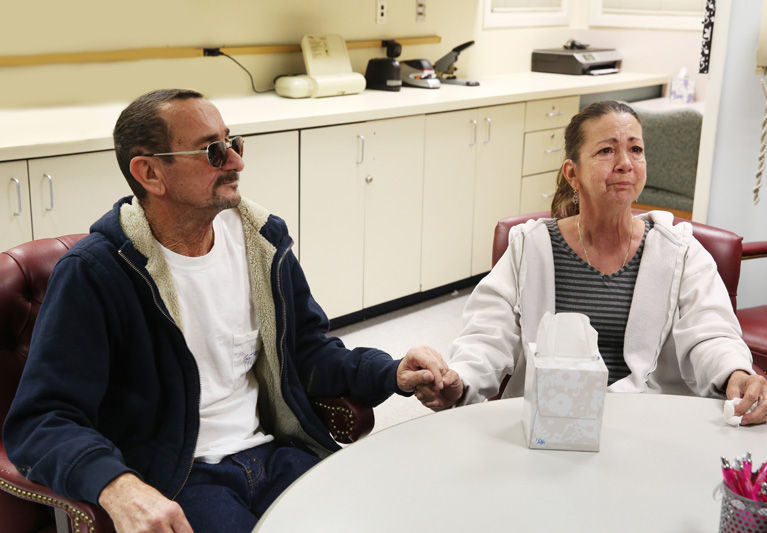
When Terry Sartain, 57, was diagnosed with cancer, he did not have health insurance, but according to his wife Gladys Sartain, he did have an angel watching over him. That angel’s name is Sandra Webster, a registered nurse at the Scully-Welsh Cancer Center at Indian River Medical Center.
Webster, along with fellow registered nurse Denise Hudspath, are the two “patient navigators” at the IRMC oncology department charged helping people like the Sartains weave their way through the maze that Webster calls “the cancer care continuum.” That’s no mean feat. Just the word “cancer” can leave the strongest folks dazed, depressed and downright disoriented. Hudspath and Webster are tasked with tending to the financial, medical, emotional and even the logistical and travel needs of approximately 100 cancer patients at a time.
Tears welling up in her eyes – and occasionally slipping past a crumpled Kleenex in her hand to trickle down her cheeks – Gladys Sartain recounts her husband’s story. “It started out,” she says leaning forward, “he said he had a toothache. We went [someplace else] and they wouldn’t see us because they said we owed them $200.”
“I went to my doctor and she says your husband doesn’t look too well, why don’t you go to the hospital? So we came to the [IRMC] emergency room. There was a wonderful doctor there and . . . he told us, ‘I’m not going to lie to you. I think it’s cancer’ but they didn’t give up on Terry. If it wasn’t for this hospital, my husband wouldn’t be here now. I’m so thankful for this place.”
Medically, with Webster’s help, Terry Sartain was then seen by specialists in otolaryngology, (eyes, nose and throat), radiation oncology, medical oncology, pulmonology, cardiology, primary care and even a Miami surgeon who specializes in oncology of the head and neck.
Financially, Webster was able to get some help for the couple through a managed Medicaid plan. Lori McCormick, administrative director of the Scully-Welsh cancer center at IRMC, joins the conversation explaining, “We [then] had to find a cancer center that would take that plan and we did, but it’s all the way down in Miami.”
McCormick, who Gladys says “always called me back, even on her days off,” joined the hospital last June and immediately made expansion of the cancer center’s navigator program a high priority.
She, Webster and Hudspath rely heavily on the Vero community including, in this case, the Visiting Nurses Association, the local chapter of the American Cancer Society and others. “We couldn’t do it alone,” says McCormick.
The National Cancer Center says a cancer navigator’s job is to coordinate a patient’s various doctors’ appointments. That’s a check for Webster.
It says they maintain communication with patients, families and health care providers. That’s a check, too.
It says they ensure that appropriate medical records are available at scheduled appointments. Check, again.
Next they say a navigator will help to find financial support. One more check.
Finally, according to the NCC, they help with arranging transportation and as of February 20, that check list is now complete. The trio of Webster, McCormick and Hudspath nailed down that final item last week.
With the help of Angel Flight Southeast, an organization operating out of Leesburg FL, Webster has arranged for Gladys and Terry Sartain to takeoff from Vero Beach’s airport for a flight to Miami. Angel Flight’s 650-plus volunteer pilots use their own aircraft, fuel and time to provide free flights to those who are financially distressed or physically unable to drive themselves to medical care facilities throughout the southeastern states. They make an average of 3,000 such flights a year and come Sunday, one more takeoff and landing will be in the books with a return flight yet to come.
Assuming surgery goes well, Webster will continue working with the Sartains during Terry’s recovery and rehabilitation.
Help for patients through “navigator” programs is becoming more and more essential as the healthcare world becomes more and more complex. Here in Vero Beach, for example, Lin Reading, a breast cancer survivor and a certified patient navigator founded the non-profit, “Friends After Diagnosis. For five years,” explains Reading, “we’ve been providing a forum for ongoing conversation and support as well as connecting survivors with community resources they might not otherwise encounter.”
Within the walls of IRMC, a first-in-the-state-of-Florida heart patient navigator program was launched a few weeks ago. Working with the American College of Cardiology, IRMC’s heart patient program provides many of the same services that McCormick’s cancer navigators do helping patients find their way through the maze of doctors’ appointments, tests and paperwork that now accompanies treatment for almost all serious diseases.
Meanwhile, the soft-spoken Terry Sartain holds tightly onto his wife’s hand as he adds, “I’ll just be happy when it’s all over, but I’m very grateful for everyone and all the help I’ve gotten.”
Gladys Sartain sums up her feelings in just five words. Looking directly at Webster and McCormick and the others in the room, she simply says, “God bless all of you.”



